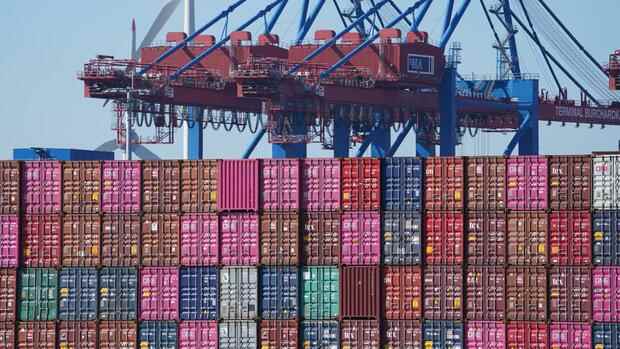Berlin Germany is entering the third year of the corona pandemic. The fourth wave is raging. But despite the pandemic, the German economy is facing a great year. According to the Munich Ifo Institute, the German economy will grow by 3.7 percent next year – more than it has been in ten years. The trade union-related business institute IMK even expects an increase of 4.5 percent.
The very good forecasts are covered by the latest association survey by the Institut der Deutschen Wirtschaft (IW): of 48 business associations surveyed, not a single one expects a decline in production or business. A large majority, on the other hand, are planning a flourishing business in the next year. The IW researchers speak of extraordinarily good expectations.
So the mood is great, even though the fourth wave is holding the country under control? That sounds like a big contradiction at first. In fact, the risk that the economy could turn out to be worse than expected is considerable. But on the other hand, there are also some encouragers who speak in favor of the strong upswing in 2022 finally coming.
Economists had already forecast strong growth for 2021. But the fourth wave and the spread of Omikron resulted in an extremely weak year-end. At the end of this year, the growth of the German economy should be well below three percent. That it is not even less is only due to the fact that the final quarter is no longer as important for the annual value.
Top jobs of the day
Find the best jobs now and
be notified by email.
Economists therefore speak of a “postponed upswing” – which should now come in 2022 instead of 2021. There are a number of reasons for this: The order books of German industry are full to the brim. Also because the global economy has recently picked up significantly. For example, the Ifo Institute is even more confident about France, Italy and the USA than it is about Germany. For all countries, the Ifo expects growth of more than four percent in 2022. Germany in turn will benefit greatly from this, all three countries are important trading partners.
IMK boss expects an upswing after the winter half-year
IW boss Michael Hüther also believes that the supply bottlenecks that have made so difficult for German industry this year will decrease in the coming year. It is true that not all problems are resolved immediately, especially in the semiconductor industry there will probably continue to be bottlenecks. But a certain relaxation can be seen in some markets.
In addition, there is hope that Corona will at least lose some of its fright if more people are vaccinated and, because of the associated higher immunity, new waves are at least flatter. The winter half of the year will slow down the economy, says IMK boss Sebastian Dullien. “After that, however, things should pick up strongly.”
And not just because the industry is getting up and running again. A higher demand could also stimulate the upswing. German citizens are still sitting on up to 200 billion euros that they accumulated as savings during the pandemic because they went less to the cinema, restaurant or shopping. If they spend at least part of this money, it should give the economy a decent boost.
However, people could continue to put the money on the high edge if the corona pandemic in 2022 is not finally brought under control, warns the President of the German Institute for Economic Research (DIW), Marcel Fratzscher, in a guest article for the Handelsblatt.
The same applies to global supply chains. They could also be interrupted again by the pandemic, especially if there should be another major production disruption in Asia due to the corona. “We have to prepare for another year of roller coaster ride, at least for the economy,” said Fratzscher. The corona pandemic remains “the greatest economic risk”.
Higher inflation could create uncertainty
And it’s not the only one. Higher inflation could also create uncertainty. The European Central Bank (ECB) is of the opinion that the latest price hikes are only temporary; the price increase, which is currently strongly driven by special factors, will subside next year.
However, there are increasing voices of those who warn that prices could definitely rise more sharply for a longer period of time. If that were the case, the industrialized countries would find themselves in a completely new mode that they would have to come to terms with again. The era of low inflation and low interest rates would be over.
There are also a number of political risks. If the conflict with Russia and Ukraine escalates further, it could depress the mood. It is completely unpredictable what consequences it would have if the right-wing extremists came to power in the presidential elections in France in April, which, according to surveys, at least cannot be ruled out.
In Italy, too, which has just been named “Country of the Year” by the “Economist” thanks to robust growth and a number of reforms, there is a presidential election coming up. Prime Minister Mario Draghi could switch to the presidency – the big question then is who will succeed him as Prime Minister. And in the US, the “midterm elections” are scheduled for the beginning of November, at which some fear a comeback of the Trump camp.
It is considered unlikely that all of these risks will become a reality. But one thing is certain: With Corona, the world will first have to go on living. And the pandemic has a major impact on the pace of the economy. Economists grudgingly admit that they would have underestimated the economic consequences of the fourth wave.
More: The German economy sees these risks for the economy
